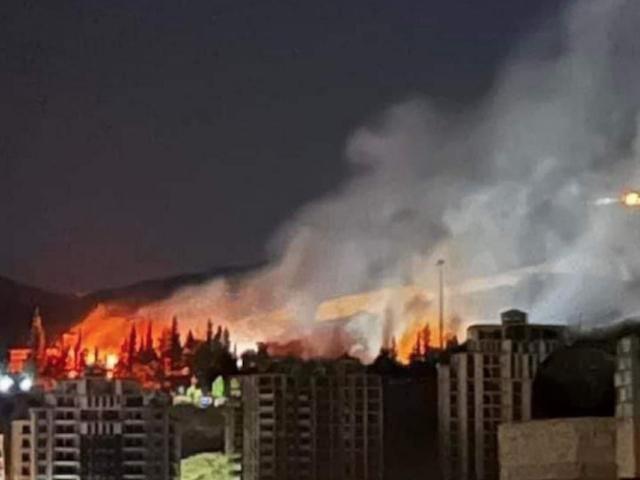Syrian defense systems reportedly engaged suspected Israeli airstrikes in the Damascus region early on July 14. This comes in response to the Israel Defense Forces' (IDF) announcement of strikes on Syrian Army facilities overnight, following the launch of two drones from Syria targeting Eilat, Israel's southernmost city, the previous day.
Heightened Security and Disruptions Expected
Emergency services are anticipated to be active at the impacted sites, with significant transport disruptions likely in the affected areas. Both Syrian and northern Israeli military forces are expected to maintain a heightened state of alert in the coming days. The potential for further airstrikes, retaliatory attacks, and exchanges of cross-border fire remains high, contributing to an atmosphere of intense tension.
Targeted Strikes and Strategic Hits
The IDF reported striking key targets including a central Syrian Army command center, additional infrastructure, and air defense systems in retaliation for the drone attack. This marks the second Israeli strike on Syria in a matter of days amid escalating tensions in the north, where the Lebanese terror group Hezbollah has been conducting near-daily attacks since October 8, purportedly in support of the Gaza Strip amid the ongoing conflict with Hamas.
#BREAKING: IDF strikes Iran-backed terrorists near Damascus pic.twitter.com/bOkA2ZeTES
— Israel War Room (@IsraelWarRoom) July 13, 2024
Casualties and Damage
Syrian state media reported the death of a Syrian soldier and injuries to several others in an alleged Israeli attack on the Kafr Sousa area of Damascus. SANA, the state-run news agency, detailed a heavy missile barrage from Israel's Golan Heights, with some missiles intercepted by Syrian air defenses. The Syrian Observatory for Human Rights reported one fatality and six injuries among regime forces and Iran-backed militia.
A History of Conflict
Israel has long conducted strikes against Iran-linked targets in Syria, where Tehran's influence has grown since it began supporting President Bashar al-Assad in the civil war that erupted in 2011. Earlier this year, a high-profile Israeli strike near the Iranian consulate in Damascus resulted in the deaths of a top Revolutionary Guard commander and six other senior IRGC officials. This provoked a massive retaliatory attempt by Iran, involving hundreds of drones, ballistic missiles, and conventional rockets, which largely failed to penetrate Israel's robust air defenses, bolstered by support from Jordanian, Saudi Arabian, and American forces. One missile did breach defenses, causing damage to a runway in southern Israel near an air-force base.
Exclusive footage of Iran's 🇮🇷 drone and missile strikes against Israel 🇮🇱
— Dr. Eli David (@DrEliDavid) April 14, 2024
👇 pic.twitter.com/y2AM5jWnN9
Increased Hostilities Amid Gaza Conflict
Israeli strikes on Syria have surged following the commencement of the Gaza war last October. Sunday’s strikes specifically targeted military sites in Syria’s southern region and a residential building in the Kafar Souseh area of Damascus. The Syrian military claimed their air defense systems managed to intercept a considerable number of the incoming missiles despite their density.
IDF's Firm Response
The IDF stated its actions were a direct response to the drone launches from Syria towards Eilat. "Overnight, the IDF struck a Syrian military command center and infrastructure sites. Additionally, terror targets used by the Syrian military’s Aerial Defense Unit were struck," the IDF declared.
Strikes in Damascus, a building was reportedly targeted. https://t.co/bAzNaWVnu3 pic.twitter.com/Ln9lDCXISx
— MenchOsint (@MenchOsint) July 13, 2024
This recent flare-up underscores the volatility of the region and the delicate balance of power that continues to be tested by ongoing conflicts and strategic military actions. Israel and Syria have been in a state of conflict since the establishment of Israel in 1948. The ongoing civil war in Syria since 2011 has seen increased Iranian influence in the region, with Tehran supporting President Bashar al-Assad. Israel has conducted numerous airstrikes targeting Iran-linked assets in Syria to prevent Iranian entrenchment near its borders. Tensions are further fueled by the activities of Hezbollah, a Lebanese terror group backed by Iran, which frequently engages in hostilities against Israel. The recent escalation, involving drone attacks and retaliatory strikes, reflects the fragile and volatile situation in the region, exacerbated by the broader conflict between Israel and Palestinian groups like Hamas.


